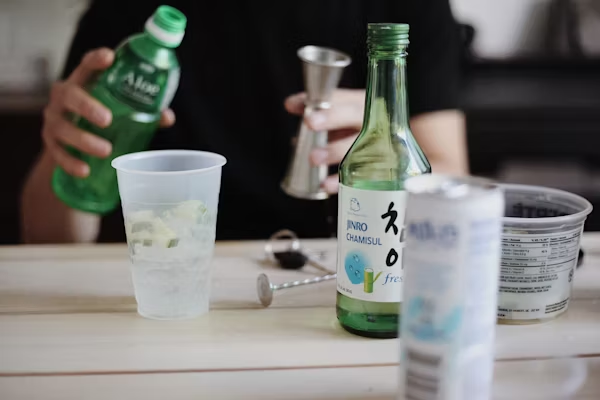When it comes to Korean beverages, many people immediately think of soju or makgeolli, but there is a lesser-known drink that deserves a spot in your glass — Sodziu. This traditional Korean rice-based liquor has a subtle charm that captivates those who appreciate delicate flavors and cultural depth. Unlike the stronger spirits that dominate the market, Sodziu is known for its clarity, smoothness, and refreshingly light taste, making it a perfect companion for any meal or social gathering.
If you’ve been searching for a drink that balances simplicity with heritage, Sodziu might be the exciting discovery you need. Let’s explore the origins, production, cultural significance, and tasting experience of this unique Korean drink.
What Is Sodziu?
Sodziu is a traditional Korean alcoholic beverage made primarily from fermented rice. It is clear and colorless, often described as smooth and mild compared to other Korean liquors. Unlike its popular cousin soju, which can be quite strong and sometimes infused with various flavors, Sodziu offers a more subtle, clean taste that makes it a refreshing alternative.
Historically, Sodziu was enjoyed in Korean households and at ceremonies, passed down through generations. Today, while not as internationally recognized as soju, it still holds an important place in Korean culinary and cultural traditions.
The History and Cultural Roots of Sodziu
Korea has a rich heritage of fermented beverages, and Sodziu is a product of centuries-old brewing practices. The drink’s origins trace back to ancient times when rice farming was central to Korean life. With rice abundant and integral to daily sustenance, Koreans found creative ways to utilize it, leading to the birth of several rice-based alcoholic drinks.
Sodziu became popular especially among villagers and during local festivals. It was often consumed during traditional celebrations like Chuseok (Korean harvest festival) or ancestral rites, symbolizing purity and respect. The making of Sodziu also reflected the harmony between humans and nature, relying on natural fermentation and local ingredients.
How Is Sodziu Made?
The process of making Sodziu is both an art and a science. It begins with carefully selecting high-quality rice, which is then washed and steamed. The steamed rice is combined with nuruk, a traditional Korean fermentation starter made from grains and natural enzymes. This starter helps break down starches into sugars, which yeast then ferments into alcohol.
Unlike other liquors that undergo distillation, Sodziu is typically brewed through natural fermentation, which results in its mild alcohol content and smooth profile. The mixture ferments for a few weeks to months, depending on the desired taste and strength.
After fermentation, the liquid is filtered carefully to remove solids, leaving behind a clear and crisp drink ready to enjoy.
Taste Profile and Serving Suggestions
Sodziu’s taste can best be described as delicate and slightly sweet, with a clean finish. It carries less bite than stronger liquors, making it approachable for those new to Korean drinks or those who prefer milder alcoholic beverages. Because it is clear and smooth, it pairs beautifully with a variety of foods.
In Korea, Sodziu is often served chilled in small glasses during meals. Its lightness complements dishes like grilled fish, fresh vegetables, or mild Korean pancakes without overpowering the flavors. The drink also works well as a refreshing sip on a warm day or as a social drink shared among friends.
Sodziu vs. Soju: Understanding the Differences
Though the names sound similar, Sodziu and soju are quite distinct. Soju is widely known globally and has a stronger alcohol content, usually around 16-25%. It is distilled and sometimes flavored, making it versatile but often more intense.
Sodziu, on the other hand, is brewed rather than distilled, resulting in a lower alcohol content and a gentler taste. It is more of a traditional, artisanal product that emphasizes purity and subtlety. If you find soju too strong or harsh, Sodziu is an excellent alternative to explore.
Health Aspects and Natural Qualities
Because Sodziu is made through natural fermentation with simple ingredients, it often contains fewer additives than commercial liquors. The fermentation process can produce beneficial enzymes and probiotics, though the alcohol content means moderation is still important.
Many traditional Korean beverages like Sodzi’u have been praised for their natural qualities and potential digestive benefits. Drinking Sodzi’u in moderation can be a pleasant way to enjoy an authentic cultural experience while being mindful of health.
Where to Find Sodziu Today
While soju dominates shelves internationally, Sodzi’u remains more of a specialty item. In Korea, it is easier to find in traditional markets, specialty liquor shops, or at restaurants focused on authentic Korean cuisine. Outside Korea, finding Sodzi’u can be a bit challenging but is growing in availability thanks to the increasing global interest in Korean culture.
Online specialty stores or Korean grocery stores may carry imported bottles. For the adventurous drinker, seeking out Sodzi’u is part of the appeal — discovering a hidden treasure in the world of traditional liquors.
Pairing Sodziu With Korean Cuisine
Sodziu’s mild and smooth character makes it a versatile pairing partner with many dishes. It goes exceptionally well with lighter Korean dishes such as steamed vegetables, mild seafood dishes, and traditional rice cakes.
The drink enhances the flavors without overpowering them, offering a balanced dining experience. For those who enjoy Korean barbecue, Sodzi’u can also act as a palate cleanser between different types of grilled meats, allowing you to savor each bite fully.
The Revival of Traditional Korean Drinks
In recent years, there has been a renewed interest in traditional Korean foods and beverages, both domestically and globally. As modern trends embrace authenticity and heritage, drinks like Sodzi’u are experiencing a revival.
This resurgence is not just about nostalgia but also about celebrating sustainable and artisanal production methods. Sodzi’u represents the connection to Korean roots, making it an exciting option for those seeking both culture and taste in their drinks.
Making Your Own Sodziu: Is It Possible?
For enthusiasts interested in home brewing, making Sodziu is possible but requires patience and a good understanding of fermentation. Using high-quality rice and a traditional nuruk starter is essential.
Home brewing can be a rewarding project, allowing you to experiment with fermentation time and ingredients to suit your taste. However, due to alcohol regulations in many countries, it’s important to be aware of local laws before attempting to produce alcoholic beverages at home.
Conclusion
Sodziu stands out as a subtle yet meaningful Korean traditional drink that deserves more recognition. Its clear appearance, delicate taste, and rich cultural background offer a unique drinking experience that appeals to both novices and seasoned connoisseurs alike. Whether you want to explore Korean culinary heritage or find a refreshing alternative to popular liquors, Sodziu is a perfect choice.
As Korean culture continues to spread worldwide, Sodziu might soon become a familiar name on international tables, inviting more people to enjoy this timeless elixir.
Frequently Asked Questions (FAQs)
What is Sodziu made from?
Sodziu is primarily made from fermented rice using a traditional Korean fermentation starter called nuruk.
Is Sodziu stronger than soju?
No, Sodziu generally has a lower alcohol content and a milder taste compared to soju.
Can Sodziu be found outside Korea?
It is less common internationally but can sometimes be found in Korean specialty stores or online.
How is Sodziu traditionally served?
Sodziu is usually served chilled in small glasses during meals or social gatherings.
Does Sodziu have health benefits?
Due to natural fermentation, it may contain beneficial enzymes, but it should be consumed in moderation.
Can I make Sodziu at home?
Yes, but it requires knowledge of fermentation and local laws permitting home alcohol production.











